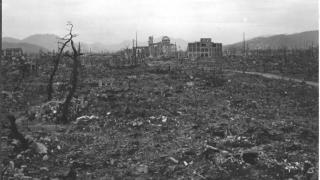June 11, 2025 (EIRNS)—U.S. Director of National Intelligence Tulsi Gabbard posted a stark warning of the catastrophic global effects that would be unleashed by nuclear war. She reports on what she learned during her trip to Hiroshima, site of the first use of a nuclear weapon, and points out that today’s nuclear weapons are far more powerful, and that even one could kill millions in minutes. She says that “as we stand here today, closer to the brink of nuclear annihilation than ever before, political elite and warmongers are carelessly fomenting fear and tensions between nuclear powers.”
“So, it’s up to us, the people, to speak up and demand an end to this madness,” she says. “We must reject that path to nuclear war, and work toward a world where no one has to live in fear of a nuclear holocaust.”
In response to wild denunciations of Gabbard’s statement as “fear-mongering,” “isolationism,” or “Russian propaganda,” one of her staffers responded: “Acknowledging the past is critical to inform the future. President Trump has repeatedly stated in the past that he recognizes the immeasurable suffering, and annihilation can be caused by nuclear war, which is why he has been unequivocal that we all need to do everything possible to work towards peace.”
The NATO-Russia conflict, including the enormously escalatory June 1 attacks on Russian strategic forces, is not the only danger that threatens the world with the specter of nuclear war.
What about Iran?
Trump expressed low confidence that he could work out an agreement with Tehran. He told the “Pod Force One” podcast: “I don’t know. I did think so, and I’m getting more and more—less confident about it.”
“I’m less confident now than I would have been a couple of months ago. Something happened to them, but I am much less confident of a deal being made,” he said. While Trump acknowledges that “it would be nicer to do it without warfare, without people dying,” it is his own insistence on Iran completely ending its nuclear enrichment that makes a deal all but impossible.
But even in that case, a proposal from Russia to handle Iran’s nuclear materials may provide a long-shot way out of an otherwise inevitable military showdown. Iranian press report that Moscow and Tehran have signed an agreement for Russia to build eight nuclear plants in Iran.
The Netanyahu government in Israel continues to threaten military action against Iran, drawing reprimands from Trump that simultaneously seem to leave the door open to Israeli strikes in the event that negotiations fail. And Iran’s recent reported theft of nuclear and military secrets from Israel may give Tehran more damaging options for a counterattack. Iran has threatened that a U.S. attack would result in Tehran expelling the U.S. from its bases in the region. Already, the U.S. diplomatic presence in the region is being reduced.
On the third major front of potential conflict, China, there are glimmers of hope alongside the ongoing danger. Following another round of U.S.-China trade discussions in London, the two countries announced progress in getting trade back on track, including a restoration of access to rare earths. “Our deal with China is done, subject to final approval with President Xi and me,” Trump announced.
And in Germany, which is now ranked by public opinion surveys in Russia as the most “unfriendly” country to Russia, prominent members of the SPD, a member of the governing coalition, have published a demand that Germany make a U-turn on its anti-Russia policy.
Tulsi Gabbard said, “It’s up to us, the people, to speak up and demand an end to this madness.” She is right. It is crucial to recognize, as Lyndon LaRouche did half a century ago, and more and more people are now acknowledging, the role of the British Empire in fostering conflicts rather than allowing a new paradigm of international relations to replace the Anglo-American hegemonism of much of the last century.
Speak out against madness, and speak up in favor of a new global renaissance of peace and development, a new architecture for international relations.






